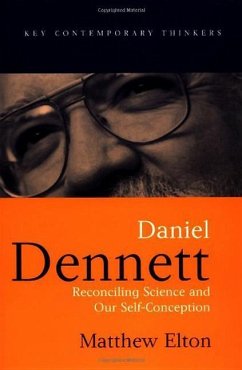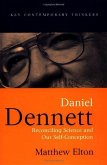Daniel Dennett is one of the most influential thinkers at the interface between philosophy and science. This book is the first comprehensive examination of Dennett's ideas on the nature of thought, consciousness, free will, and the significance of Darwinism. Elton examines Dennett's unique response to the question of when and how science should affect the conception that we have of ourselves. Whilst rejecting reductionism on the grounds that much of our self-conception is immune to revision, Dennett also rejects the idea that science has nothing to say about our self-conception - an idea that still flourishes within contemporary philosophy. What emerges is a view in which our understanding of ourselves is constrained by, but not continuous with, scientific inquiry. Elton excels at bringing out the themes that bind together different aspects of Dennett's work. At the same time he casts new light on more specific controversies: Could robots ever think, feel, and enjoy freedom? Does Dennett really explain consciousness? Are mental states real or merely 'useful fictions'? Do we have free will? Is the self a 'centre of narrative gravity'? Written in an exceptionally clear and engaging style, the book is a highly original introduction to contemporary thinking about the relationship between mind and science.
Hinweis: Dieser Artikel kann nur an eine deutsche Lieferadresse ausgeliefert werden.
Hinweis: Dieser Artikel kann nur an eine deutsche Lieferadresse ausgeliefert werden.
"Elton s book will be an invaluable companion for anyone hoping to get to grips with Dennett s rich and expansive vision." David Bain, The Philosophical Quarterly April 2005
'For over thirty years Daniel Dennett has been among the most important, innovative and engaging philosophers in the world. With the appearance of his book, Consciousness Explained , in 1991, his fame and his influence spread throughout the academic world and beyond. While there has been a great deal written about Dennett's ideas, until now we have had no systematic, integrated account of the "real patterns" that run through Dennett's philosophy. Elton's clear, readable and well-informed book provides just such an account. This is the ideal book for readers - and they are many - who've been captivated by reading Dennett's work and want to understand how the themes that he explores with such intellectual exuberance fit together in an integrated account of human agents and the sciences that study them.' - Professor Stephen Stich, Department of Philosophy and Center for Cognitive Science, Rutgers University
'This is an excellent introduction to the twists and turns of Dennett's thinking. In guiding the reader through a luminous yet sometimes puzzling maze of images, empirical excursions, thought experiments and hard arguments, Matthew Elton lays bare the deep unifying agenda that animates all of Dennett's work. Combining the roles of careful critic and generous host, Elton's patient excavations will help the novice and excite the expert.' - Professor Andy Clark, Director of the Cognitive Science Program, Department of Philosophy, Indiana University
'For over thirty years Daniel Dennett has been among the most important, innovative and engaging philosophers in the world. With the appearance of his book, Consciousness Explained , in 1991, his fame and his influence spread throughout the academic world and beyond. While there has been a great deal written about Dennett's ideas, until now we have had no systematic, integrated account of the "real patterns" that run through Dennett's philosophy. Elton's clear, readable and well-informed book provides just such an account. This is the ideal book for readers - and they are many - who've been captivated by reading Dennett's work and want to understand how the themes that he explores with such intellectual exuberance fit together in an integrated account of human agents and the sciences that study them.' - Professor Stephen Stich, Department of Philosophy and Center for Cognitive Science, Rutgers University
'This is an excellent introduction to the twists and turns of Dennett's thinking. In guiding the reader through a luminous yet sometimes puzzling maze of images, empirical excursions, thought experiments and hard arguments, Matthew Elton lays bare the deep unifying agenda that animates all of Dennett's work. Combining the roles of careful critic and generous host, Elton's patient excavations will help the novice and excite the expert.' - Professor Andy Clark, Director of the Cognitive Science Program, Department of Philosophy, Indiana University






![Family Record of Daniel J. Borntrager and the Decendants [sic] ... by Sam R., Wife Lizzie, and Son Rudy Borntrager. Family Record of Daniel J. Borntrager and the Decendants [sic] ... by Sam R., Wife Lizzie, and Son Rudy Borntrager.](https://bilder.buecher.de/produkte/68/68584/68584983m.jpg)

